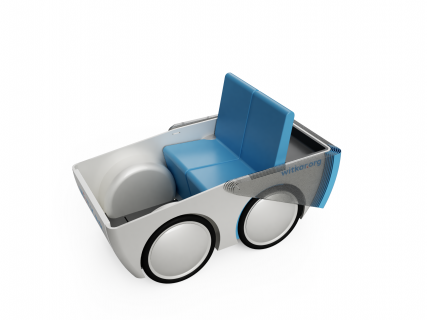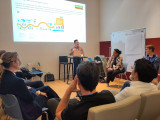Oplossing voor first en last mile
Check the video footage from 1974:
English
Nederlands

Oplossing voor first en last mile
English
Nederlands
Witkar brengt je op plaatsen waar het openbaar vervoer niet rijdt, de zogenaamde first mile en last mile. Witkar is een systeem van deelvoertuigen. Witkar rijdt op veilige stads- snelheid en is geschikt voor individueel vervoer.
Het voertuig heeft geen wachttijden en is daarmee op de korte afstand toch snel. Witkar heeft een netwerksysteem, geen stelsel van lijnen. De gebruiker rijdt rechtstreeks naar de hub van bestemming en hoeft dus niet over te stappen. Doordat het individueel is, is het geschikt voor gebieden met weinig vervoer. Het OV en Witkar vullen elkaar dus perfect aan.
Witkar heeft een trapgenerator waarmee je de snelheid van de elektromotor aangeeft. De overkapping kun je zelf openen en sluiten.
In een Witkar-hub is ruimte voor meerdere deelvervoermiddelen zoals OV-fiets, Felyx of Biro. Witkarren gebruiken 25% van de ruimte die auto’s innemen.
Witkar is in 1974 gestart op initiatief van Luud Schimmelpennink.
Een prototype van de nieuwe Witkar wordt op dit moment ontwikkeld.
Get notified about new updates, opportunities or events that match your interests.

Join us for an exclusive webinar featuring three leading European cities sharing their proven strategies for EV charging infrastructure placement. Learn from real-world experiences and discover data-driven approaches that are transforming urban mobility across Europe.
𝗪𝗵𝗮𝘁 𝗬𝗼𝘂'𝗹𝗹 𝗟𝗲𝗮𝗿𝗻
🏙️ 𝗦𝘁𝗿𝗮𝘁𝗲𝗴𝗶𝗰 𝗣𝗹𝗮𝗰𝗲𝗺𝗲𝗻𝘁 𝗔𝗽𝗽𝗿𝗼𝗮𝗰𝗵𝗲𝘀 - Discover how Brighton & Hove, Oslo, and Metropolitan Region of Amsterdam Electric have developed their EV charging strategies
📊 𝗗𝗮𝘁𝗮-𝗗𝗿𝗶𝘃𝗲𝗻 𝗗𝗲𝗰𝗶𝘀𝗶𝗼𝗻 𝗠𝗮𝗸𝗶𝗻𝗴 - Learn about the tools and methodologies these cities use to optimize charging point locations
🚗 𝗦𝗲𝗿𝘃𝗶𝗻𝗴 𝗔𝗹𝗹 𝗥𝗲𝘀𝗶𝗱𝗲𝗻𝘁𝘀 - Understand how to address the needs of residents without private parking spaces
🌍 𝗜𝗻𝘁𝗲𝗿𝗻𝗮𝘁𝗶𝗼𝗻𝗮𝗹 𝗕𝗲𝘀𝘁 𝗣𝗿𝗮𝗰𝘁𝗶𝗰𝗲𝘀 - Gain insights from three different countries and municipal perspectives
💡 𝗟𝗲𝘀𝘀𝗼𝗻𝘀 𝗟𝗲𝗮𝗿𝗻𝗲𝗱 - Avoid common pitfalls and learn from real implementation experiences
𝗙𝗲𝗮𝘁𝘂𝗿𝗲𝗱 𝗦𝗽𝗲𝗮𝗸𝗲𝗿𝘀
Kieran Fitsall - Brighton & Hove Council
Sture Portvik & Sara Teige Kalsaas - City of Oslo
Annekee de Jager - MRA-e (Amsterdam Metropolitan Region)
Hosted by Sanne van Breukelen - Cenex Nederland
𝗪𝗵𝘆 𝗔𝘁𝘁𝗲𝗻𝗱?
With Europe requiring 6.8 million public charging points by 2030, municipalities face unprecedented challenges in planning and implementing EV infrastructure. This webinar brings together three cities that have successfully navigated these challenges, offering practical insights for:
- Municipal planning departments
- Urban mobility professionals
- EV infrastructure developers
- Policy makers and city officials
- Transport consultants
𝗞𝗲𝘆 𝗧𝗼𝗽𝗶𝗰𝘀 𝗖𝗼𝘃𝗲𝗿𝗲𝗱
- Historical approaches vs. modern data-driven strategies
- Stakeholder engagement
- Grid capacity considerations and smart charging integration
- On-street charging solutions for urban residents
𝗪𝗵𝗼 𝗦𝗵𝗼𝘂𝗹𝗱 𝗔𝘁𝘁𝗲𝗻𝗱
This webinar is essential for anyone involved in:
- Urban planning and development
- Sustainable transport initiatives
- EV infrastructure deployment
- Municipal policy development
- European mobility strategy
𝗥𝗲𝗴𝗶𝘀𝘁𝗿𝗮𝘁𝗶𝗼𝗻
Don't miss this opportunity to learn from Europe's leading cities in EV infrastructure planning. Register now to secure your spot and gain access to exclusive insights that could transform your city's approach to EV charging.
---
This webinar is part of Cenex's ongoing commitment to accelerating the transition to sustainable transport through knowledge sharing and best practice dissemination across European cities.

𝟭𝟬 𝘆𝗲𝗮𝗿𝘀 𝗮𝗴𝗼, 𝗵𝗲𝗮𝘃𝘆 𝘁𝗿𝘂𝗰𝗸𝘀 𝘄𝗲𝗿𝗲 “𝘁𝗼𝗼 𝗵𝗮𝗿𝗱 𝘁𝗼 𝗲𝗹𝗲𝗰𝘁𝗿𝗶𝗳𝘆.”
𝗡𝗼𝘄? 𝗙𝗹𝗲𝗲𝘁𝘀 𝗮𝗿𝗲 𝗽𝗿𝗼𝘃𝗶𝗻𝗴 𝘁𝗵𝗲𝘆 𝗰𝗮𝗻 𝘄𝗼𝗿𝗸 — 𝗯𝘂𝘁 𝗼𝗻𝗹𝘆 𝘄𝗵𝗲𝗻 𝗿𝗼𝘂𝘁𝗲𝘀, 𝗰𝗵𝗮𝗿𝗴𝗶𝗻𝗴, 𝗮𝗻𝗱 𝗼𝗽𝗲𝗿𝗮𝘁𝗶𝗼𝗻𝘀 𝗮𝗿𝗲 𝗶𝗻 𝘀𝘆𝗻𝗰.
On 𝟮𝟳 𝗔𝘂𝗴 2025 at 𝟭𝟬:𝟬𝟬 𝗖𝗘𝗦𝗧, we’ll break down exactly what works today, where the pain points still hurt, and how to electrify your fleet without disrupting your operations.
You’ll get:
• The biggest shifts in electric truck technology and adoption over the last decade
• Which fleets are running e-trucks successfully today — and where they still don’t fit
• The toughest operational and infrastructure hurdles (and why they persist)
• When e-trucks hit profitability based on TCO, range, and duty cycle
• A practical roadmap to start electrifying your fleet without disrupting operations
Speakers:
Tharsis Teoh, Smart Freight Centre — Perspective of the freight sector
Michael Ayres, Flexible Power Systems — Experience from live projects on depot charging
Rishabh Ghotge, Cenex Nederland — Live demo of KITE, a free tool for electrifying your truck fleets
Hosted by our favourite Sanne van Breukelen
Join us to cut through the noise and address the real barriers European fleets face.
Cenex, NextETRUCK, MACBETH Project, ALICE, Alliance for Logistics Innovation through Collaboration in Europe (ETP LOGISTICS), 2Zero , Connekt, Connectr - Energy innovation, ERTICO - ITS Europe, POLIS network, Niklas Schmalholz, Holly Nakatomi, Megan de Langen

On the 5th of July, during Demoday #28, we zoomed in on one of the pressing challenges facing the energy transition: grid congestion, and more specifically, how to keep the people who maintain the grid moving efficiently.
Grid congestion is a serious and growing concern for grid operator Alliander. It is therefore essential to speed up the grid reinforcement as much as possible. Alliander’s Operation 2.0 team is exploring innovative ways to work smarter, faster, and more flexibly to keep pace with these developments.
Their efforts focus on three tracks:
• Alleviating staff shortages by training office employees to occasionally support fieldwork.
• Exploring technologies like advanced ground radar to get better insights into underground assets.
• Improving the logistics of supplying mechanics to ensure they have the right tools, in the right place, at the right time.
This last track was the main focus of our work session.
Logistics experiences show that mechanics collect materials inefficiently when supplying their vans and jobs, resulting in stock corrections, less control over stock, unnecessary work for logistics staff, and valuable mechanic hours being lost, which leads to less execution work. A few key problems stood out:
• Supplies are scanned inconsistently, so the system doesn’t reflect what is actually in stock.
• Every van is different, with a custom layout that suits the preferences of its mechanic.
• The work itself is unpredictable, which makes standardised restocking difficult.
• With a transition to smaller electric vans, space is becoming even more limited.
A simple optimisation of the process is not enough, especially without considering the human element. For many mechanics, a visit to the supply centre is more than just logistics. It is a moment of connection, a short break from the road, or simply a chance for a good coffee.
In groups of four, we brainstormed creative ideas to improve the supply of Alliander vans while keeping the needs and routines of mechanics in mind.
Some highlights:
• Peer-to-peer van inspiration: Let mechanics share the layout of their vans with colleagues. They can exchange best practices and take pride in an efficient setup. Adding a bit of gamification might boost motivation even more.
• A mobile supply service: A supply van could drive around to restock mechanic vans, reducing the need to visit the supply centre. However, this might remove the social element of taking a break with colleagues.
• Smarter routing: Track the location of mechanics only in relation to nearby grid faults. This way, the closest available mechanic can respond without feeling like their movements are constantly being monitored.
• Package-based resupply: Inspired by delivery service Picnic, mechanics could exchange complete “supply packages” instead of picking out materials individually. Collaborating with wholesale suppliers could reveal more useful insights.
• Automatic stock tracking: Tag all materials with RFID chips and use sensors installed in the door of the van to register what is removed from the van. This eliminates the need for manual scanning and reduces the chance of mistakes.
Do you have a bright idea to improve how mechanics work? Let us know in the comments or send a message to Noor at noor@amsterdaminchange.com.
A big thank you to Thomas Hoekstra and Iris van der Zanden from Alliander for bringing this challenge to the network, and to Chantal Inia from Royal HaskoningDHV for moderating the session.


Hai Luud en Hans, Lijkt mij een heel interessant project (witkar of ELF) om als recreatieve verbinding zoals bijvoorbeeld in het groengebied DeBretten, tussen Sloterdijk Centrum en Het Laatste Huis. https://www.amsterdam.nl/toerisme-vrije-tijd/parken/bretten/denk-mee-toekomst-bretten/
Hallo Luud,
leuk om weer van witkar te horen.
ik heb de oude witkarpas nog steeds, ging regelmatig rijden vanaf Elandsgracht. Heb paar jaar geleden nog geprobeerd om de ELF van Organic TransIT https://organictransit.com/ naar Almere te krijgen, 2 ELFs rijden nu nog in Almere.
Misschien kan ik iets voor je betekenen rondom de verwerking van de data.